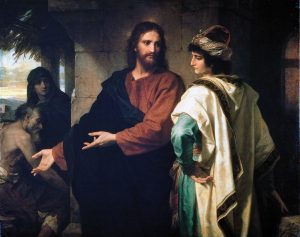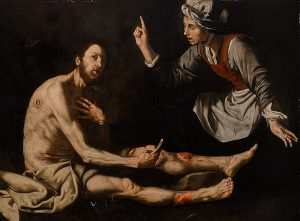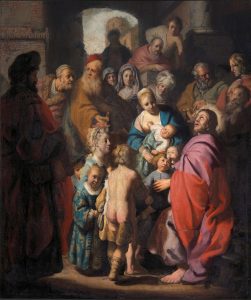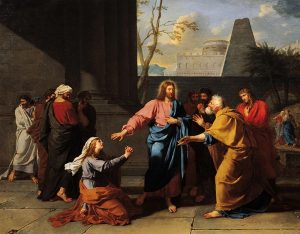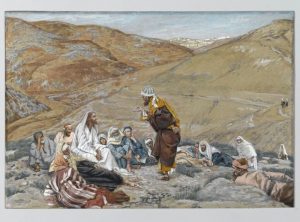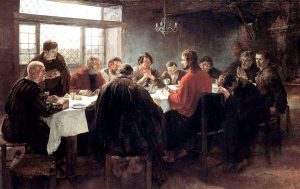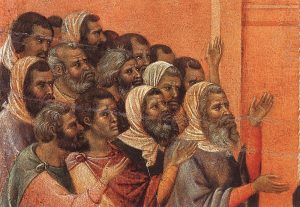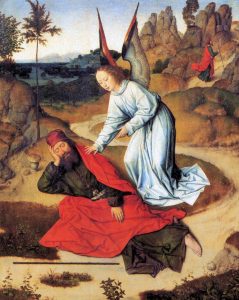Thoughts on Sunday’s Lessons for Oct. 20, 2024 (Pentecost 22B/Proper 24)
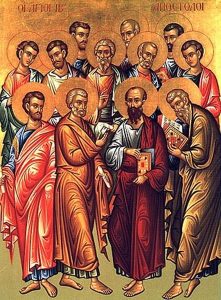
James and John stand on either side of Jesus in this Orthodox icon of Jesus and the apostles. (Click image to enlarge.)
First Reading (Track One): Job 38:1-7, 34-41
Job has been loudly lamenting his condition and looking everywhere for God, angrily demanding that God come out of hiding and hear him. Now Job gets his wish. God speaks to him out of a whirlwind in power and might, and quickly sets Job in his place, hurling poetic words at Job like thunderbolts: “Where were you when I laid the foundation of the earth? Tell me, if you have understanding.” There is no promise that chaos and disaster will not occur in wind and flood and starvation. Nothing in creation is greater than its Creator.
First Reading (Track Two): Isaiah 53:4-12
Throughout Sunday’s readings we hear of servant leadership, sacrifice, and walking humbly with our God. Isaiah’s “Suffering Servant,” who we meet often in our readings (most recently only last month) may make us think of Jesus in his willing sacrifice to bear the sins of many. In its original context, though, Isaiah writes of the servant’s suffering in the past tense, remembering Israel itself as the servant, the sacrificial pain of its sad exile now finally come to an end.
Psalm (Track One): Psalm 104:1-9,35, 37c
Psalm 104, a hymn of exaltation, surely rang out over the ancient Temple in Jerusalem amid blasts on the shofar and shouts of praise. The Psalmist envisions God clothed in majesty and splendor, wrapped in a cloak of light that crosses the heavens. God rides across the world on the wings of clouds, spreading out mountains and valleys, oceans and rivers, setting Earth immovably on its foundations and separating the land from the water.
Psalm (Track Two): Psalm 91:9-16
In Psalm 91 we offer grateful thanksgiving to God as our protector and provider. In a striking catalogue of the many bad things that can happen to good people – evil events, plague, injury, even attacks by lions and venomous serpents – the Psalmist reminds us that we live in God’s shadow. We recognize God as our refuge and our stronghold. God will help us because we are bound to God in love. When we call on God, God will answer.
Second Reading: Hebrews 5:1-10
These verses from the letter to the Hebrews presents Jesus as the perfect high priest, a new high priest with a new covenant and new sacrifice. But this high position did not come easily. Because Jesus was fully human, he was not immune from suffering; he suffered “with loud cries and tears.” He learned obedience through his suffering, even as God’s own Son and the perfect image of God. Thus Jesus became the greatest of the line of priests that began with King Melchizedek, the first high priest named in Genesis.
Gospel: Mark 10:35-45
Jesus nicknamed James and John “the Sons of Thunder,” and they do seem to be a fiery pair. We saw them thundering just a few weeks ago, when they complained that other people were casting out demons in Jesus’s name. Now they are acting clueless again. They don’t ask Jesus, they tell Jesus that they want to sit at his side in God’s kingdom. Jesus has news for them: To follow Jesus we must be servants, not those served; if we wish to be first, we must become the slave of all.

